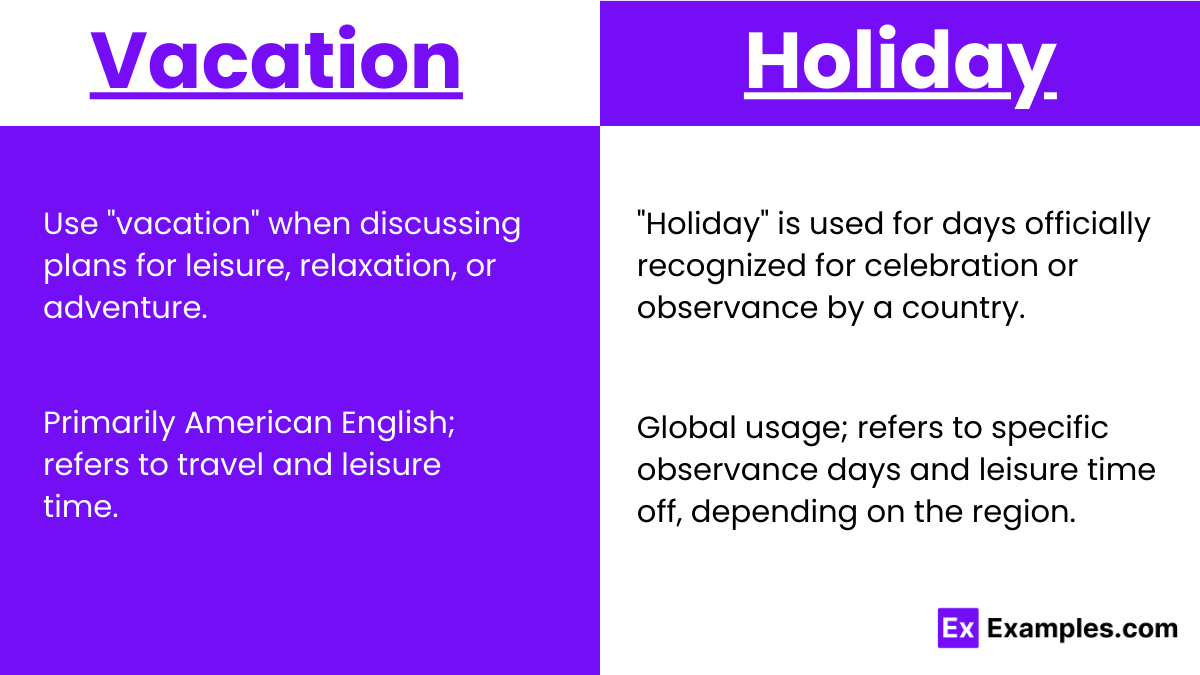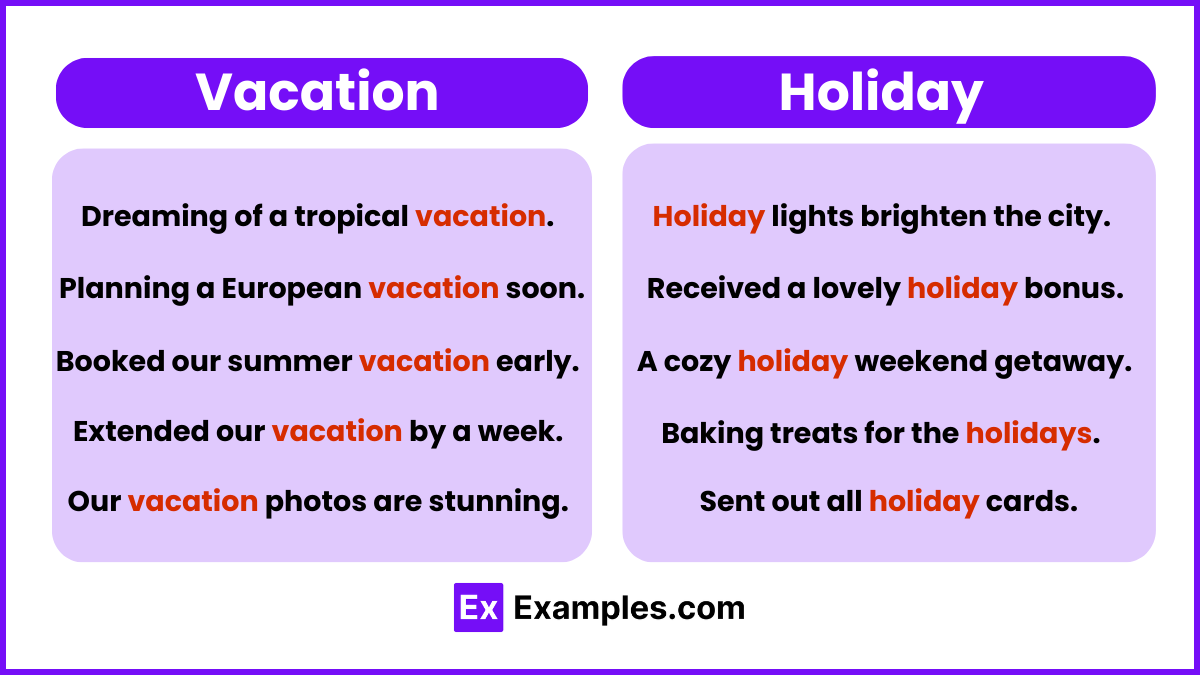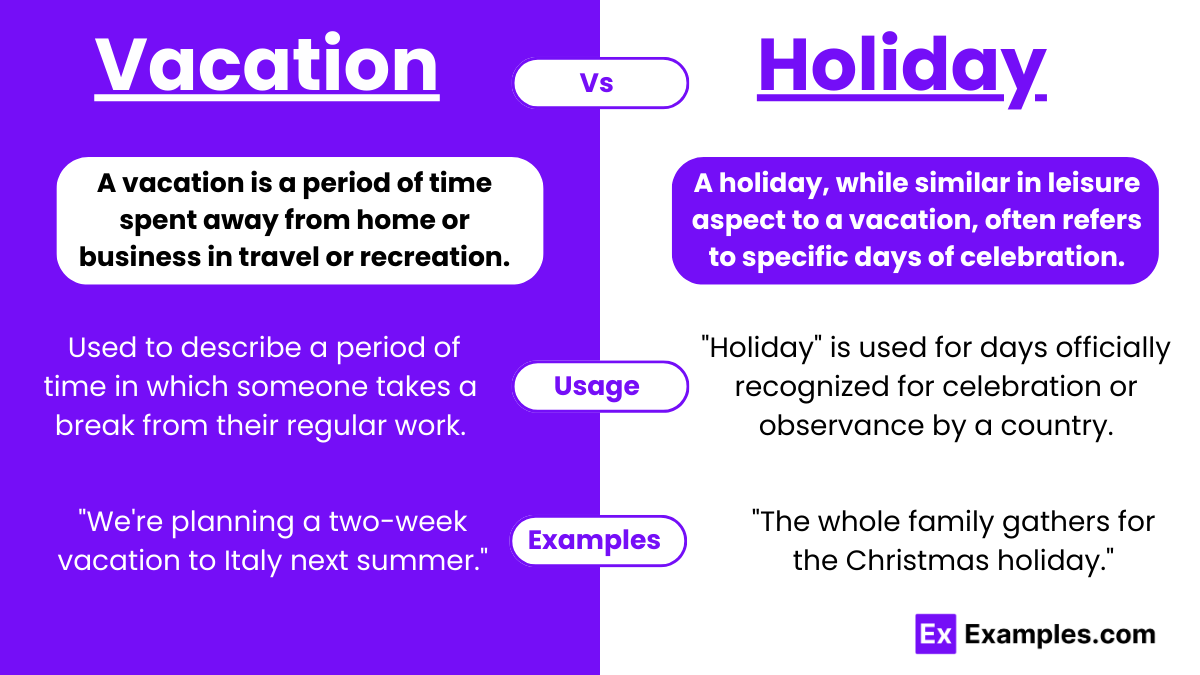Vacation vs Holiday – Meanings, Difference, Examples, Usage
When we take a break from our daily routines, we often use the words “vacation” and “holiday” to describe our time off. But are these two terms really the same? In this article, we’ll explore the subtle yet significant differences between a vacation and a holiday. Whether it’s the duration, the purpose, or the cultural implications, understanding these distinctions can help us better plan and enjoy our time away from the hustle and bustle of everyday life. Join us as we delve into the world of leisure time, examining how vacations and holidays fit into our lives and what they truly mean to us.
Vacation and Holiday – Meanings
- Vacation: A vacation is a period of time spent away from home or business in travel or recreation. Typically used in American English, it often involves traveling to a different location for leisure, exploration, or relaxation. Vacations can range from short getaways to extended trips abroad.
- Holiday: A holiday, while similar in leisure aspect to a vacation, often refers to specific days of celebration or observance, recognized by a culture, religion, or government. In British English, “holiday” can also mean a period spent away from home for relaxation, similar to the American “vacation.”
Summary
In conversation, “vacation” usually connotes a break from routine for leisure or travel, often involving some journey. “Holiday,” however, might refer to both the public days of celebration and personal time off for relaxation, depending on the context and regional usage. When we think of going on a “holiday” in the UK, it’s akin to the US “vacation.” Conversely, “holiday” in the US typically signifies recognized days like Thanksgiving or Independence Day.
How to Pronounce Vacation and Holiday
- Vacation: Pronounced as /vəˈkeɪʃ(ə)n/ (vuh-KAY-shuhn).
- Holiday: Pronounced as /ˈhɒlɪdeɪ/ (HOL-i-day).
The pronunciation of “vacation” features a stress on the second syllable with a long “a” sound, while “holiday” is more straightforward, with emphasis on the first syllable.
Differences between Vacation and Holiday
| Aspect | Vacation | Holiday |
|---|---|---|
| Definition | A break from routine, often spent traveling or relaxing. | A day of observance or celebration; also used to mean a break similar to a vacation in some regions. |
| Usage | Primarily American English; refers to travel and leisure time. | Global usage; refers to specific observance days and general leisure time off, depending on the region. |
| Duration | Can be of any length, from a weekend to several weeks. | Often tied to specific dates or periods, but can extend to longer breaks in certain contexts. |
| Context | Personal choice and planning involved; often involves leisure activities. | Determined by cultural, religious, or national significance; may also include personal leisure time. |
| Travel | Often implies travel, either domestic or international. | May not necessarily involve travel; can be celebrated at home or away. |
How to Remember the Difference between Vacation and Holiday
A useful tip is to associate “vacation” with “vacating” one’s usual environment for leisure or travel. Meanwhile, think of “holiday” as a “holy day” or a special day of observance, though it can also mean taking time off for leisure, especially in British English.
When to Use Vacation and Holiday

Usage of Vacation
- Travel for Leisure: Use “vacation” when discussing plans for leisure, relaxation, or adventure.
- Extended Time Off Work or School: “Vacation” is suitable for referring to a significant break from regular duties such as work or school, particularly when this time is used for personal enjoyment or travel.
- Seasonal Breaks: In contexts where a break is taken during specific seasons, like summer or winter, and it involves leisure activities or travel, the term “vacation” is commonly used.
- Describing a Planned Getaway: When detailing future travel plans for enjoyment or a break from routine, “vacation” is the term to use, indicating a planned period of leisure.
- Using Vacation Days: In a work context, when employees take time off that is allocated as part of their employment benefits, it is referred to as taking a vacation.
Usage of Holiday
- Public or National Observances: “Holiday” is used for days officially recognized for celebration or observance by a country or culture, including those commemorating historical events, traditions, or cultural practices.
- Religious Celebrations: This term is appropriate for days designated for religious observance or celebration, reflecting the diverse cultural and religious practices around the world.
- School Breaks: The term “holiday” often describes scheduled breaks in the academic calendar, allowing students and staff a pause from educational activities.
- Bank or Public Sector Holidays: Days when government offices, banks, or other public institutions are closed, often in observance of a public holiday, are referred to as holidays.
- In British English, Time Off for Travel or Leisure: In British English, “holiday” can also mean leisure time away from work, similar to the American use of “vacation,” encompassing travel or relaxation activities.
How to use Vacation and Holiday
Using “Vacation”
- As a Noun: “Vacation” is most commonly used as a noun to describe a period of time in which someone takes a break from their regular work or school activities, often for the purpose of travel or relaxation.
- Noun Example: “I’m looking forward to my vacation next month.”
- As a Verb: Less commonly, “vacation” can also be used as a verb, meaning to take a vacation or go on a vacation.
- Verb Example: “We plan to vacation in the Caribbean this winter.”
Using “Holiday”
- As a Noun: “Holiday” is primarily used as a noun to denote a day of festivity or recreation when no work is done. It can refer to public holidays, religious holidays, or general days of celebration.
- Noun Example: “Christmas is my favorite holiday.”
- As an Adjective: In some cases, “holiday” can be used as an adjective to describe something related to a holiday, such as holiday decorations or holiday plans.
- Adjective Example: “We put up the holiday lights to celebrate the season.”
Vacation and Holiday – Examples

Examples of Vacation
- Firstly, we’re planning a two-week vacation to Italy next summer.
- Moreover, taking a vacation can significantly improve mental health and well-being.
- On the other hand, a staycation is a vacation spent at home or nearby.
- Additionally, many choose tropical destinations for their vacation getaways.
- Finally, budgeting for a vacation requires careful planning and saving.
Examples of Holiday
- Firstly, the whole family gathers for the Christmas holiday.
- Besides, many companies offer paid holidays to their employees.
- Conversely, the school holiday schedule aligns with major national holidays.
- Furthermore, booking a holiday package can simplify travel plans.
- In conclusion, holiday traditions vary widely across cultures.
Synonyms
| Term | Synonyms |
|---|---|
| Vacation | Break, getaway, recess, holiday (in British English) |
| Holiday | Festivity, celebration, break, vacation (in British English), public holiday |
Exercise
Fill in the blanks with either “vacation” or “holiday” to complete the sentences accurately.
- The family planned a __________ to the mountains for some skiing and snowboarding.
- Many people travel during the December __________ season to visit family.
- She took a two-week __________ from work to travel through Europe.
- The __________ calendar includes days like Easter and Thanksgiving.
- For their summer __________, they decided to explore the national parks.
Answers
- vacation
- holiday
- vacation
- holiday
- vacation
FAQ’S
Do You Say Holiday or Vacation?
“Vacation” is preferred in American English for leisure trips, while “holiday” is used in British English and for public celebrations.
Why Do We Say Vacation Instead of Holiday?
In the US, “vacation” refers to personal leisure time off, distinguishing it from “holiday,” which denotes public or religious observances.
What Is the Difference Between a Vacation Day and a Holiday?
A “vacation day” is personal time off for leisure, whereas a “holiday” is a designated public or cultural day off work or school.
What Is Considered a Vacation?
A vacation is a period of leisure time away from work or daily duties, often involving travel for relaxation or enjoyment.
Do Holidays Count as Leave?
Holidays are generally not counted as personal leave since they’re public or statutory days off provided by employers or recognized by law.


